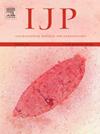Extensive transcriptional differentiation and specialization of a single-host parasite aligns with niche turnover generated by its host’s metamorphosis
IF 3.2
2区 医学
Q1 PARASITOLOGY
引用次数: 0
Abstract
Foundational theory on life cycle evolution suggests that given genetic independence, the phenotypes presented by different life stages will diverge more when they occupy more distinct niches. When divergence between stages is significant and punctual, we typically consider the life cycle complex. In parasites, the delineation between simple and complex life cycles is usually made between those that utilize single and multiple host species. However, many parasites can experience significant niche shifts in a single host. To explore the potential for a host’s metamorphosis to shape divergence between stages across its parasite’s life cycle, we quantified the transcriptional differentiation and specialization that the protozoan parasite Ophryocystis elektroscirrha exhibits across the metamorphosis of its host, the monarch butterfly. We found evidence that O. elektroscirrha differentiates in concordance with the ecological turnover imposed by monarch transitions to different stages, and that patterns of transcriptional decoupling across O. elektroscirrha exceeded even those of its host. However, due to its greater gene content, the monarch butterfly exhibited greater total transcriptional turnover than its parasite. These findings suggest that a deeper understanding of life cycle evolution for both free-living and parasitic lifestyles may be facilitated by more nuanced and continuous descriptions of life cycle complexity.

单宿主寄生虫广泛的转录分化和特化与其宿主变态产生的生态位转换相一致。
生命周期进化的基础理论认为,在遗传独立性的条件下,不同生命阶段所表现出的表型在不同的生态位中差异越大。当不同阶段之间的差异显著且准时时,我们通常认为生命周期是复杂的。在寄生虫中,简单和复杂生命周期的区分通常是在利用单一和多个宿主物种的寄生虫之间进行的。然而,许多寄生虫可以在单个宿主中经历显著的生态位变化。为了探索寄主变态在寄主生命周期不同阶段之间形成分化的可能性,我们量化了原生动物寄主黑脉金斑蝶在其寄主变态过程中所表现出的转录分化和特化。研究结果表明,电蛾的分化与黑脉金斑蝶向不同阶段过渡所带来的生态转换是一致的,而且电蛾的转录解耦模式甚至超过了寄主。然而,由于其较高的基因含量,帝王蝶表现出比其寄生虫更大的总转录周转。这些发现表明,通过对生命周期复杂性进行更细致和连续的描述,可以更深入地了解自由生活和寄生生活方式的生命周期演变。
本文章由计算机程序翻译,如有差异,请以英文原文为准。
求助全文
约1分钟内获得全文
求助全文
来源期刊
CiteScore
8.40
自引率
2.50%
发文量
76
审稿时长
23 days
期刊介绍:
International Journal for Parasitology offers authors the option to sponsor nonsubscriber access to their articles on Elsevier electronic publishing platforms. For more information please view our Sponsored Articles page. The International Journal for Parasitology publishes the results of original research in all aspects of basic and applied parasitology, including all the fields covered by its Specialist Editors, and ranging from parasites and host-parasite relationships of intrinsic biological interest to those of social and economic importance in human and veterinary medicine and agriculture.

 求助内容:
求助内容: 应助结果提醒方式:
应助结果提醒方式:


